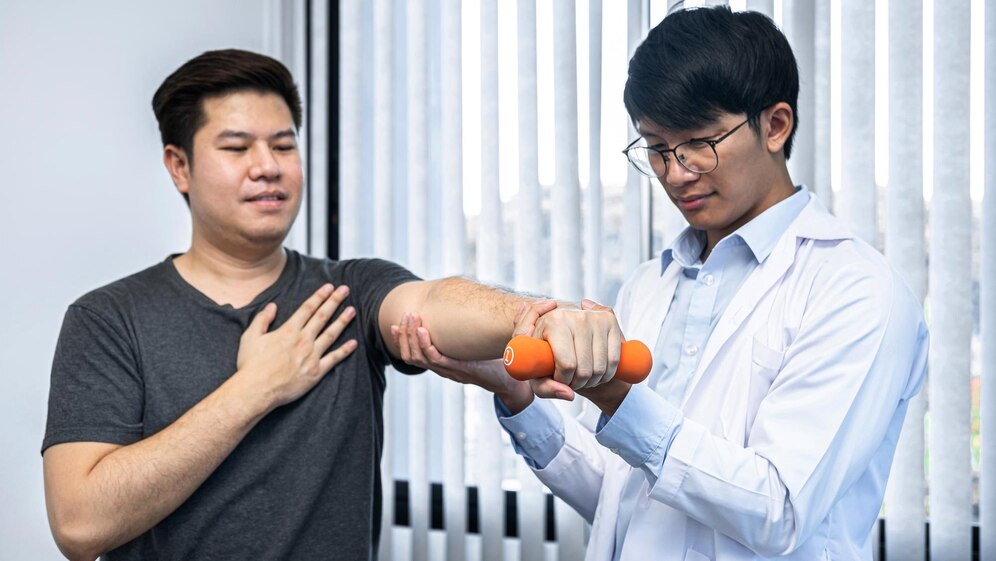Repetitive Strain Injuries (RSIs) encompass a range of musculoskeletal disorders caused by repetitive motions, forceful exertions, and prolonged awkward postures. Common examples include carpal tunnel syndrome, tendinitis, and bursitis. These conditions can cause pain, stiffness, weakness, and numbness, significantly impacting daily activities and work productivity.
What is a Repetitive Stress Injury?
A Repetitive Stress Injury (RSI), also known as a Repetitive Strain Injury, refers to damage to muscles, tendons, and nerves caused by repetitive motions or overuse. It often occurs in people who perform repetitive tasks like typing, assembly line work, or sports activities.
RSIs can develop gradually over time, leading to pain, weakness, and decreased range of motion in the affected area. Without proper treatment, these injuries can significantly impact daily function and productivity.
Common Causes of RSIs
Repetitive stress injuries are caused by repetitive movements, poor posture, and overuse of muscles. Some of the most common triggers include:
- Typing or computer work for prolonged periods.
- Frequent use of handheld devices (e.g., texting, gaming).
- Repetitive lifting or manual labor in workplaces.
- Playing musical instruments for long hours.
- Sports activities that involve repetitive motion (e.g., tennis, golf).
- Poor workplace ergonomics leading to excessive strain.
Symptoms of Repetitive Stress Injuries
The symptoms of RSI vary depending on the severity and location of the injury. Common symptoms include:
- Pain, tenderness, or throbbing in affected muscles or joints.
- Numbness or tingling in the fingers, wrists, or arms.
- Weakness or decreased grip strength.
- Stiffness and limited range of motion.
- Swelling or inflammation in affected areas.
If untreated, RSI symptoms can worsen over time, leading to chronic pain and disability.
The Role of Physical Therapy in RSI Treatment

Why Choose Physical Therapy for RSI?
Physical therapy is a highly effective non-invasive treatment for RSIs. It focuses on reducing pain, improving mobility, and preventing recurrence through targeted exercises, manual therapy, and ergonomic training.
A licensed physical therapist (PT) will assess the patient’s condition, identify the root cause of the injury, and develop a customized treatment plan to restore function and prevent further damage.
Benefits of Physical Therapy for RSI
Physical therapy offers numerous benefits for patients with repetitive stress injuries, including:
- Pain relief through manual therapy and stretching.
- Restored flexibility and mobility to affected joints.
- Strengthening exercises to prevent future injuries.
- Improved posture and ergonomics to reduce strain.
- Education on movement modifications for daily activities.
By addressing muscle imbalances and movement dysfunctions, physical therapy helps patients recover without relying on medication or surgery.
Key Physical Therapy Techniques for RSI Treatment
Manual Therapy for Pain Relief
Manual therapy includes hands-on techniques to relieve pain and improve mobility. Some commonly used methods are:
- Massage therapy to reduce muscle tension and inflammation.
- Myofascial release to break up scar tissue and improve flexibility.
- Joint mobilization to restore normal movement patterns.
Stretching and Flexibility Exercises
Stretching helps reduce muscle tightness and improve range of motion in affected areas. Common stretching techniques include:
- Wrist and forearm stretches for computer-related RSIs.
- Shoulder and neck stretches for posture-related injuries.
- Lower back stretches for repetitive lifting injuries.
Strength Training for Injury Prevention
Strengthening exercises help restore muscle function and prevent RSIs from recurring. Key areas targeted include:
- Wrist and forearm strengthening for carpal tunnel syndrome.
- Core stability exercises for posture correction.
- Resistance training to improve grip and hand strength.
Postural Training and Ergonomic Adjustments
Many RSIs result from poor posture and workplace ergonomics. A physical therapist will provide:
- Posture correction exercises to align the spine and reduce strain.
- Ergonomic workplace modifications (e.g., proper desk height, wrist rests).
- Training on correct lifting techniques for labor-intensive jobs.
FAQ: Frequently Asked Questions About Physical Therapy for RSI
1. How long does it take to recover from RSI with physical therapy?
Recovery time depends on severity, but most patients see improvement within 4 to 8 weeks with consistent physical therapy sessions and home exercises.
2. Can physical therapy completely cure RSI?
Yes, physical therapy can fully resolve mild-to-moderate RSI cases. Severe cases may require ongoing management, but therapy significantly reduces symptoms and prevents recurrence.
3. What happens during a physical therapy session for RSI?
A session typically includes manual therapy, guided exercises, stretching, posture training, and ergonomic advice to address the root cause of RSI.
4. Do I need a doctor’s referral for physical therapy?
In most cases, you don’t need a referral to see a physical therapist, but some insurance providers may require one. Check with your provider for details.
5. Can physical therapy help prevent RSI from recurring?
Yes! Physical therapy teaches proper movement techniques, strengthening exercises, and ergonomic modifications to prevent RSI from coming back.
Conclusion
Physical therapy plays a crucial role in the management of RSIs, providing effective treatment options for pain relief, improved function, and injury prevention.
By working closely with a qualified physical therapist, individuals with RSIs can experience significant improvement in their symptoms, regain their functional abilities, and return to their daily activities with greater ease and comfort. Schedule an appointment with our Physical therapist for Repetitive stress injury treatment 469) 496-2456 or visit us https://texasspecialtyclinic.com/
